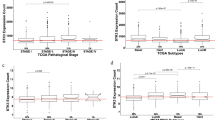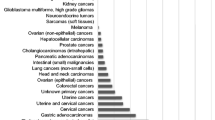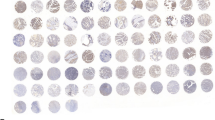Abstract
Ski-interacting protein (SKIP) is a nuclear hormone receptor-interacting cofactor, interactions with the proto-oncogene Ski, appears to modulate a number of signalling pathways involved in control of cell proliferation and differentiation, and may play a critical role in oncogenesis. In the present study, to investigate the potential roles of SKIP in breast cancer, expression patterns, interaction and the correlation with clinical/prognostic factors of SKIP and Ki-67 were examined among patients with breast cancer. Immunohistochemistry and Western blot analysis were performed for SKIP in 85 breast carcinoma samples. The data were correlated with clinicopathological features. The univariate and multivariate survival analyses were also performed to determine their prognostic significance. We found that SKIP was over expressed in breast carcinoma as compared with the adjacent normal tissues. High expression of SKIP was positively associated with histological grade (P = 0.01) and Ki-67 (P = 0.004). Univariate analysis showed that SKIP expression was associated with a poor prognosis (P = 0.006). While in vitro, following release of breast cancer cell lines from serum starvation, the expression of SKIP was up-regulated, whereas p27 was down-regulated. In addition, we employed small interfering RNA (siRNA) technique to knock down SKIP expression and observed it effects on MDA-MB-231 cells growth. SKIP depletion by siRNA inhibited cell proliferation, blocked S phase and decreased cyclin A and cyclin B levels. On the basis of these results, we suggested that SKIP overexpression was involved in the pathogenesis of breast cancer, which might serve as a future target for breast cancer.






Similar content being viewed by others
References
Buess M, Terracciano L, Reuter J, Ballabeni P, Boulay JL, Laffer U, Metzger U, Herrmann R, Rochlitz C (2004) Amplification of SKI is a prognostic marker in early colorectal cancer. Neoplasia 6(3):207–212. doi:10.1593/neo.03442
Chen Y, Zhang L, Jones KA (2011) SKIP counteracts p53-mediated apoptosis via selective regulation of p21Cip1 mRNA splicing. Genes Dev 25(7):701–716. doi:10.1101/gad.2002611
Chen J, Mao H, Zou H, Jin W, Ni L, Ke K, Cao M, Shi W (2013) Up-regulation of ski-interacting protein in rat brain cortex after traumatic brain injury. J Mol Histol 44(1):1–10. doi:10.1007/s10735-012-9444-9
Colmenares C, Stavnezer E (1989) The ski oncogene induces muscle differentiation in quail embryo cells. Cell 59(2):293–303. doi:0092-8674(89)90291-2
Dahl R, Wani B, Hayman MJ (1998) The Ski oncoprotein interacts with Skip, the human homolog of Drosophila Bx42. Oncogene 16(12):1579–1586. doi:10.1038/sj.onc.1201687
Esteva FJ, Sahin AA, Cristofanilli M, Arun B, Hortobagyi GN (2002) Molecular prognostic factors for breast cancer metastasis and survival. Semin Radiat Oncol 12(4):319–328. doi:S1053-4296(02)80033-9
Fukuchi M, Nakajima M, Fukai Y, Miyazaki T, Masuda N, Sohda M, Manda R, Tsukada K, Kato H, Kuwano H (2004) Increased expression of c-Ski as a co-repressor in transforming growth factor-beta signaling correlates with progression of esophageal squamous cell carcinoma. Int J Cancer 108(6):818–824. doi:10.1002/ijc.11651
Heider TR, Lyman S, Schoonhoven R, Behrns KE (2007) Ski promotes tumor growth through abrogation of transforming growth factor-beta signaling in pancreatic cancer. Ann Surg 246(1):61–68. doi:10.1097/SLA.0b013e318070caf
Khine MM, Aung W, Sibbons PD, Howard CV, Clapham E, McGill F, Van Velzen D (1994) Analysis of relative proliferation rates of Wilms’ tumor components using proliferating cell nuclear antigen and MIB-1 (Ki-67 equivalent antigen) immunostaining and assessment of mitotic index. Lab Invest 70(1):125–129
Kitamoto M, Nakanishi T, Kira S, Kawaguchi M, Nakashio R, Suemori S, Kajiyama G, Asahara T, Dohi K (1993) The assessment of proliferating cell nuclear antigen immunohistochemical staining in small hepatocellular carcinoma and its relationship to histologic characteristics and prognosis. Cancer 72(6):1859–1865
Kittler R, Putz G, Pelletier L, Poser I, Heninger AK, Drechsel D, Fischer S, Konstantinova I, Habermann B, Grabner H, Yaspo ML, Himmelbauer H, Korn B, Neugebauer K, Pisabarro MT, Buchholz F (2004) An endoribonuclease-prepared siRNA screen in human cells identifies genes essential for cell division. Nature 432(7020):1036–1040. doi:10.1038/nature03159
Kiyono K, Suzuki HI, Morishita Y, Komuro A, Iwata C, Yashiro M, Hirakawa K, Kano MR, Miyazono K (2009) c-Ski overexpression promotes tumor growth and angiogenesis through inhibition of transforming growth factor-beta signaling in diffuse-type gastric carcinoma. Cancer Sci 100(10):1809–1816
Le Scolan E, Zhu Q, Wang L, Bandyopadhyay A, Javelaud D, Mauviel A, Sun L, Luo K (2008) Transforming growth factor-beta suppresses the ability of Ski to inhibit tumor metastasis by inducing its degradation. Cancer Res 68(9):3277–3285
Leong GM, Subramaniam N, Figueroa J, Flanagan JL, Hayman MJ, Eisman JA, Kouzmenko AP (2001) Ski-interacting protein interacts with Smad proteins to augment transforming growth factor-beta-dependent transcription. J Biol Chem 276(21):18243–18248. doi:10.1074/jbc.M010815200
Leong GM, Subramaniam N, Issa LL, Barry JB, Kino T, Driggers PH, Hayman MJ, Eisman JA, Gardiner EM (2004) Ski-interacting protein, a bifunctional nuclear receptor coregulator that interacts with N-CoR/SMRT and p300. Biochem Biophys Res Commun 315(4):1070–1076. doi:10.1016/j.bbrc.2004.02.004
Mann CD, Neal CP, Garcea G, Manson MM, Dennison AR, Berry DP (2007) Prognostic molecular markers in hepatocellular carcinoma: a systematic review. Eur J Cancer 43(6):979–992. doi:10.1016/j.ejca.2007.01.004
Parkin DM, Bray F, Ferlay J, Pisani P (2002) Global cancer statistics. CA Cancer J Clin 55(2):74–108
Prathapam T, Kuhne C, Banks L (2001) The HPV-16 E7 oncoprotein binds Skip and suppresses its transcriptional activity. Oncogene 20(52):7677–7685. doi:10.1038/sj.onc.1204960
Prathapam T, Kuhne C, Banks L (2002) Skip interacts with the retinoblastoma tumor suppressor and inhibits its transcriptional repression activity. Nucleic Acids Res 30(23):5261–5268
Ritter M, Kattmann D, Teichler S, Hartmann O, Samuelsson MK, Burchert A, Bach JP, Kim TD, Berwanger B, Thiede C, Jager R, Ehninger G, Schafer H, Ueki N, Hayman MJ, Eilers M, Neubauer A (2006) Inhibition of retinoic acid receptor signaling by Ski in acute myeloid leukemia. Leukemia 20(3):437–443. doi:10.1038/sj.leu.2404093
Smith A, Simanski S, Fallahi M, Ayad NG (2007) Redundant ubiquitin ligase activities regulate wee1 degradation and mitotic entry. Cell Cycle 6(22):2795–2799
Takahata M, Inoue Y, Tsuda H, Imoto I, Koinuma D, Hayashi M, Ichikura T, Yamori T, Nagasaki K, Yoshida M, Matsuoka M, Morishita K, Yuki K, Hanyu A, Miyazawa K, Inazawa J, Miyazono K, Imamura T (2009) SKI and MEL1 cooperate to inhibit transforming growth factor-beta signal in gastric cancer cells. J Biol Chem 284(5):3334–3344. doi:10.1074/jbc.M808989200
Zhang C, Baudino TA, Dowd DR, Tokumaru H, Wang W, MacDonald PN (2001) Ternary complexes and cooperative interplay between NCoA-62/Ski-interacting protein and steroid receptor coactivators in vitamin D receptor-mediated transcription. J Biol Chem 276(44):40614–40620. doi:10.1074/jbc.M106263200
Zhou S, Fujimuro M, Hsieh JJ, Chen L, Hayward SD (2000) A role for SKIP in EBNA2 activation of CBF1-repressed promoters. J Virol 74(4):1939–1947
Zhu Q, Krakowski AR, Dunham EE, Wang L, Bandyopadhyay A, Berdeaux R, Martin GS, Sun L, Luo K (2007) Dual role of SnoN in mammalian tumorigenesis. Mol Cell Biol 27(1):324–339. doi:10.1128/MCB.01394-06
Acknowledgments
This work was supported by the National Natural Scientific Foundation of China Grant (No. 30972937), Natural Scientific Foundation of Jiangsu Province Grant (No. H201017).
Conflict of interest
The authors declare that they have no conflict of interests.
Author information
Authors and Affiliations
Corresponding authors
Additional information
Xiaobing Liu and Qichao Ni have contributed equally to this work.
Rights and permissions
About this article
Cite this article
Liu, X., Ni, Q., Xu, J. et al. Expression and prognostic role of SKIP in human breast carcinoma. J Mol Hist 45, 169–180 (2014). https://doi.org/10.1007/s10735-013-9546-z
Received:
Accepted:
Published:
Issue Date:
DOI: https://doi.org/10.1007/s10735-013-9546-z




